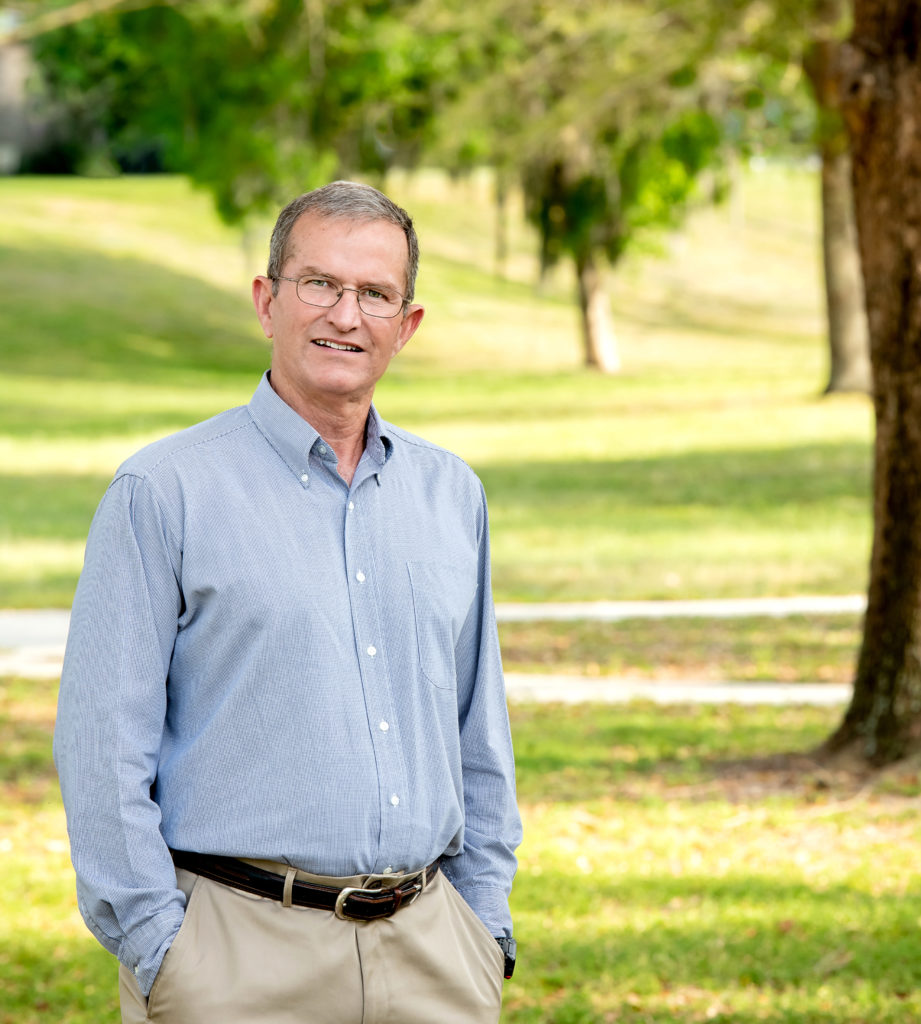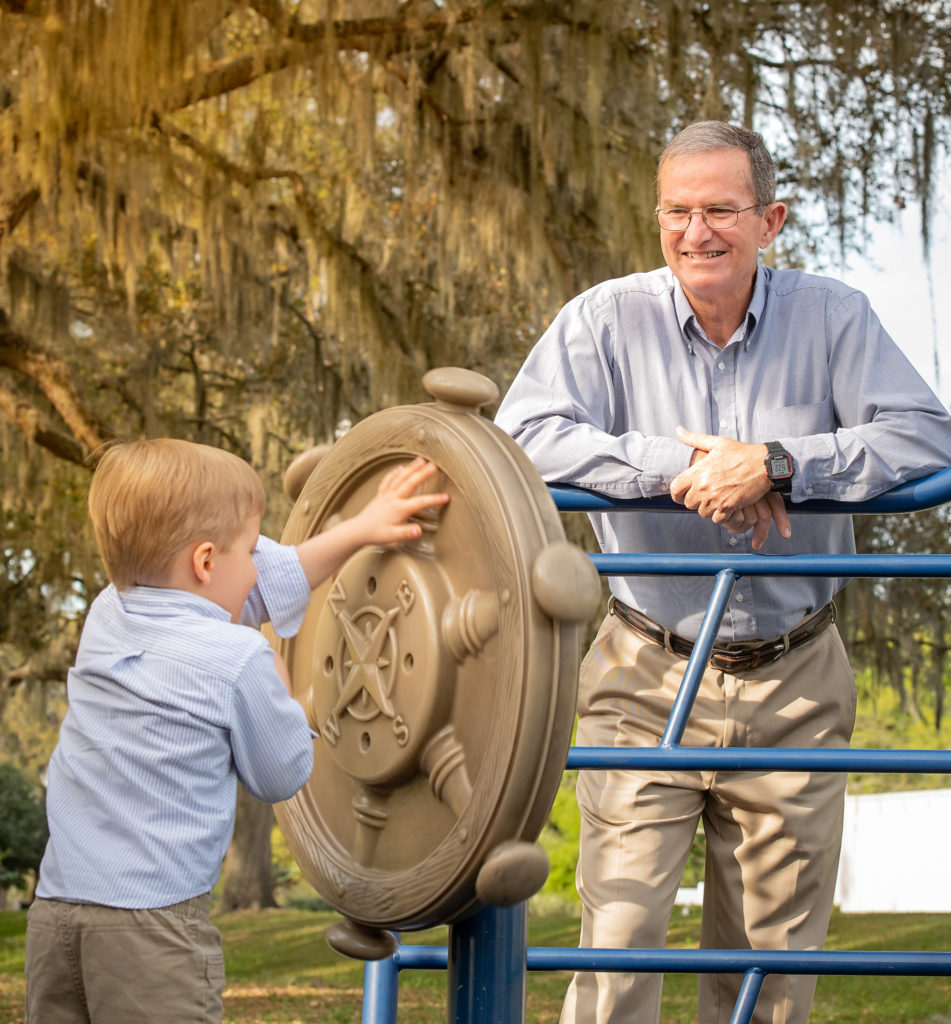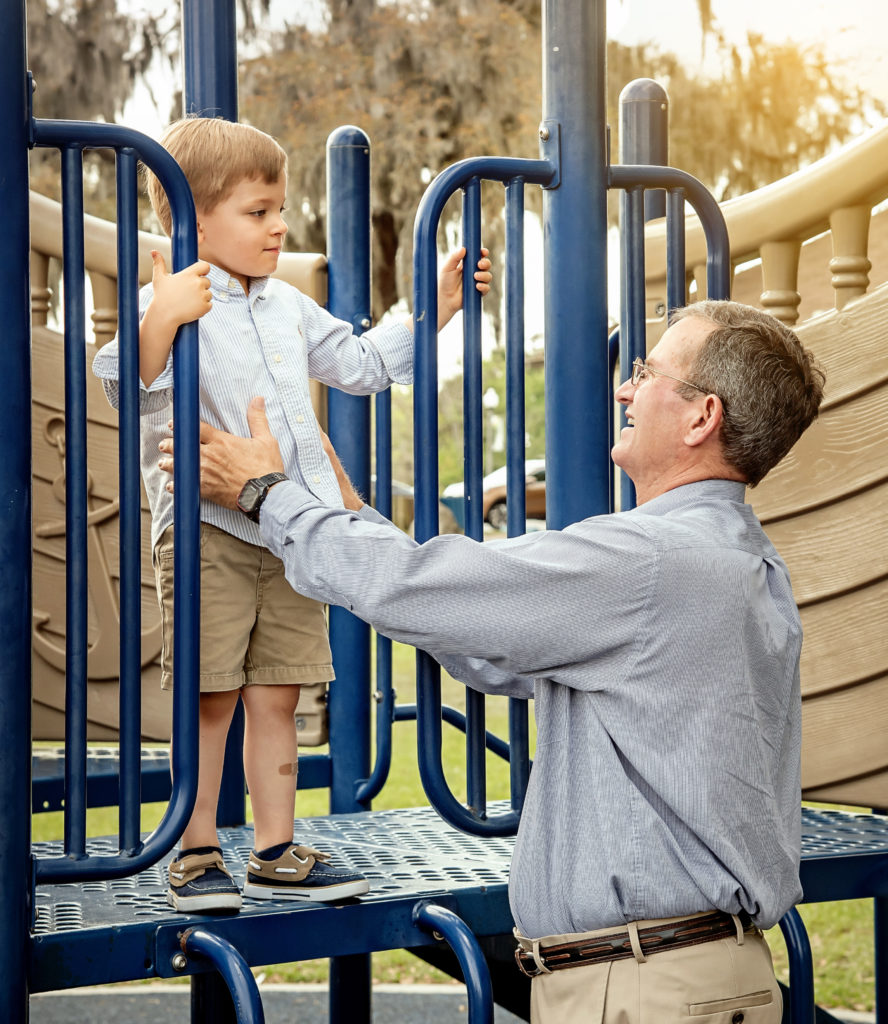Former State Attorney Brad King opens a new chapter inspired by his family.
 The sun is beginning to dip below the treetops in Brad King’s southeast Ocala neighborhood, bathing the area in a gentle light on a mild spring-like evening.
The sun is beginning to dip below the treetops in Brad King’s southeast Ocala neighborhood, bathing the area in a gentle light on a mild spring-like evening.
Down the long driveway that leads to the ranch home, a boy zips back and forth across the yard in a little red Jeep under the watchful eye of Brad’s wife, Tammy. The Jeep whirs from grass to concrete and back to grass while Tammy takes a few deliberate steps to stay within mom-reach of the zigzagging tyke.
Brad is standing in the garage watching. Just a few months after retiring as State Attorney for the five-county 5th Judicial Circuit, he’s smiling and looks relaxed, in stark contrast with the stone-faced prosecutor who for 32 years stared down remorseless killers, rapists and child molesters.
You would think those brushes with such brutal men and women would have taken their toll. They didn’t. Brad relished each fight, he says. And budget cuts, an increasingly routine fact of life, were no fun, but those didn’t drive him from office earlier than he wanted either.
In the end, Brad wasn’t pushed into retirement by the pressures of the job or the wearying avalanche of villains and reprobates with whom he was forced to contend.
He was tugged ever so gently by the little boy playing in his yard. Brad and Tammy’s new son, Oliver.
In a wide-ranging interview at his home, one of the very few he has granted during more than three decades in public life, Brad reflected on his reasons for his unexpected retirement, his plans for the future and his views on his legal career and the law in general.
He eases into a chair at one end of a dark dining room table that is scarred from two decades of family dinners, homework assignments, celebrations and class projects. He could afford a new table, of course. He was making more than $170,000 a year as State Attorney when he retired late last year, and his retirement income will keep his family comfortable well into the future. He probably could build a new table, for that matter. He built the family home with his own hands more than 30 years ago, and two additions. But the table has meaning for him, like the 1997 five-speed pickup truck that he refuses to part with because it was the vehicle his boys drove as teenagers and that he hopes Oliver will drive when he comes of age in a dozen years or so.
Ah, yes, Oliver.
 Brad says he planned to work until 70 or so, following in the footsteps of his mentors like Willie Meggs, who was well into his 70s when he stepped away as State Attorney for the 2nd Judicial Circuit five years ago. But last year, at 62 and with two more four-year terms in his sights, Brad decided to hang it up and let his executive director, Bill Gladson, succeed him.
Brad says he planned to work until 70 or so, following in the footsteps of his mentors like Willie Meggs, who was well into his 70s when he stepped away as State Attorney for the 2nd Judicial Circuit five years ago. But last year, at 62 and with two more four-year terms in his sights, Brad decided to hang it up and let his executive director, Bill Gladson, succeed him.
“Every four years I would reevaluate, say, OK, do I really believe I’m supposed to be here,” he says. “And this past time was the first time I really sat down and prayed about it and thought about it and talked to Tammy about it. I just didn’t feel the same calling to it that I always have. I just didn’t.”
“I think I could tell that he was not having as much fun, because he really enjoyed what he did for years,” Tammy says. “So, it wasn’t totally a surprise.”
Oliver played a major part in their decision.
But to understand where Oliver fits in, you have to go back more than 20 years to when Brad and Tammy adopted a little girl named Caydee.
The couple already had three children–Andrew, Brooke and Chase–when they decided to adopt Caydee, a 3-year-old girl with some severe emotional problems.
It was rough going from the beginning. Caydee suffered from what Brad describes as reactive attachment disorder, likely a result of having little valuable human contact in her critical infant and toddler years, according to a psychiatrist who evaluated her during the adoption process. Brad and Tammy couldn’t hold her. They couldn’t sit and read books to her. She didn’t want to be touched.
The couple worked with her patiently, treated her as one of their biological children and loved her unconditionally. But as she grew, she became subtly defiant. She didn’t act out in big ways. It was just that she refused to do what she was told. Eventually, she left home at 18.
The psychiatrist who evaluated Caydee many years ago had warned them at the time that they were in for “rough sledding,” Tammy says.
“Little did I know, that psychiatrist knew what she was talking about,” Tammy says. “It’s almost devastating to see your child self-destruct. When we talk to her, she will tell you she is living the life she chose and she would do it again. It’s almost impossible to fathom how someone could not want a loving home.”
Four years ago, Caydee gave birth to Oliver. Brad and Tammy brought her and the baby home from an abusive situation in Tennessee, helped her get a driver’s license and a job. Three weeks later, she was running away and using drugs, Brad says.
 Caydee did stick around long enough to attend church service on Father’s Day four years ago. The sermon was about what it means to be a father. On the way home, she asked, “Who’s going to be that for Oliver,” Brad says. “And I said, ‘As long as you’ll let me, I’ll be that for Oliver because he really needs that. You’ve got to have a strong father figure and mother figure in your life.’”
Caydee did stick around long enough to attend church service on Father’s Day four years ago. The sermon was about what it means to be a father. On the way home, she asked, “Who’s going to be that for Oliver,” Brad says. “And I said, ‘As long as you’ll let me, I’ll be that for Oliver because he really needs that. You’ve got to have a strong father figure and mother figure in your life.’”
Not long after that, Brad was wrapping up a first-degree murder trial in Kissimmee when he got a call from a friend that Caydee had dropped off Oliver, then just several months old, at her home. She left no food for him and didn’t say where she was going, when she’d be back, or even if she’d be back. The baby was clothed in only a sock for a diaper.
The Florida Department of Children and Families allowed Oliver to be sheltered with Brad and Tammy while they started the adoption process. That involved the heartbreaking step of asking the courts to terminate Caydee’s parental rights.
In 2019, the courts awarded full custody of Oliver to Brad and Tammy. Caydee didn’t contest the request. The baby’s father didn’t show up for the hearing.
Brad and Tammy still see Caydee from time to time. She came home this past Thanksgiving, but “she caused a ruckus,” Brad says, and stormed out of the house.
“We still give her every chance to right her life and make something of herself,” he says. “But we also tell her that with the mindset that she has, we cannot allow her to affect Oliver. It’s just saying if you choose to live your life a certain way, we cannot let it affect everyone else.”
With Oliver approaching preschool age, Brad and Tammy began to think about how best to raise this young boy. Tammy had quit work to help raise Caydee, but she loves her job at the couple’s church. She would quit it for Oliver in an instant, but Brad says he doesn’t want her to make that sacrifice.
“I said, I can retire and make nearly what I make working, and that way there’s somebody there to take him to school, to pick him up from school if he’s sick … and I really wanted to be with him,” Brad offers. “I’m going to be there to just really pour into his life, to do things with him, to make sure he knows we’re always there, that we care about him, and make sure he knows he’s loved and there’s always going to be somebody there for him.”
Brad mulled becoming a school resource officer. He had been a Marion County sheriff’s deputy many years ago, before law school, so the work was familiar and interesting to him. And being a resource officer would allow him to keep the same schedule as Oliver.
So, at 62, he returned to the police academy, where most of his classmates were 30 or 40 years his junior. Most of them didn’t know him, didn’t know he had been the region’s chief law enforcement officer for 30 years. Some of his instructors weren’t sure what to make of him either, a recruit old enough to collect Social Security. And he had fun with that.
He smiles as he recalls that, during physical training, one instructor asked him almost apologetically if he could run a mile with the rest of the class.  “I said, ‘Well, I’ll give it a try.’” He did not divulge that he routinely runs four miles a day. And, during weapons training, another trainer asked if he’d ever fired a gun. He said he’d do his best. He finished fourth in his class in marksmanship.
“I said, ‘Well, I’ll give it a try.’” He did not divulge that he routinely runs four miles a day. And, during weapons training, another trainer asked if he’d ever fired a gun. He said he’d do his best. He finished fourth in his class in marksmanship.
Brad graduated near the top of his class in February but is having second thoughts about becoming a resource officer as it might not afford him quite the flexibility he wants for Oliver. He is now eyeing a part-time role teaching law at the College of Central Florida and perhaps a day a week as an auxiliary officer for the Ocala Police Department. He’s keeping his options open.
That Brad left a job he loved–and that by all measures was very successful at–for his adopted son surprises no one who knows him well.
“Not at all,” says longtime friend and colleague David Ellspermann, who was Marion County Clerk of Court for much of the time King was State Attorney. “Brad focused his life on three things–his faith, his family and his profession.”
Ellspermann is aware his friend’s public persona is that of a stiff, buttoned-up, emotionless lawman. He chuckles at the notion because it is so at odds with the man he knows–the man of quiet faith, who cares so deeply for his family. The man with the biting sense of humor and a “mischievous” streak. But he is effusive in his praise of King as a prosecutor.
“I hold him up as probably one of the best public servants, not only that I know, but that I know of,” he says. “There is no self-gratification. He didn’t do things for recognition and good press. He does what’s best for the community and victims and the law enforcement community.”
King’s primary opponent on many cases, 5th Judicial Circuit Public Defender Mike Graves, agrees.
He recalls an instance many years ago when they were on opposite sides in a murder trial. The judge came into possession of a letter from the defendant that Brad believed was a crucial piece of evidence. But the judge said he wasn’t going to release it to prosecutors.
“Brad told him he had signed search warrants and was prepared to search the judge’s chambers if necessary,” Graves states. “There was a long hush in the courtroom. It was the one time in my life I had the sense to keep my butt in the chair and my mouth shut,” he adds with a laugh.
The judge turned over the document.
 “Brad wasn’t doing it to grandstand,” Graves says. “That’s the thing you have to know. He just felt so strongly that he was legally entitled to it and needed it for his case that he was willing to take on the judge.”
“Brad wasn’t doing it to grandstand,” Graves says. “That’s the thing you have to know. He just felt so strongly that he was legally entitled to it and needed it for his case that he was willing to take on the judge.”
Brad recalls one case in which he had to contemplate applying justice versus mercy.
“You always consider, you know, tempering justice,” he muses. “Is there a real reason to temper justice with mercy? And there were times when I would say, yes, that was the right thing to do.”
He spoke of the case in which a 13-year-old boy walked up behind his sister, who was doing dishes before school, and shot her dead.
“He said he heard voices telling him to do it, but he had had no mental health issues before, his parents said, no, there’s no history of him hallucinating, hearing voices, anything like that. But he otherwise was a good kid, did good in school, you know. Did all the things a good kid does. Wasn’t any trouble. There was just like this, why did it happen? Nobody knew. So, we tried to figure for that family, you know, what’s right for them. They’ve lost one child by being murdered by the other child, and they were adamant that they thought that other child could be saved, could be salvaged.”
He says his office worked out a plea, indicted the teen as an adult for first-degree murder, and gave him a long term of probation with the understanding that he would go to prison if he violated. He also got an 18-month sentence on a separate charge as a juvenile that allowed him to get treatment.
“There’s no science to it,” Brad states. “You consider what the victim or the victim’s family wants, you consider their prior record if they have any.  You consider what kind of person they are as far as are they constantly in trouble at school, getting suspended, getting in fights. But if they’re a decent person who’s done something stupid, it’s a little bit different than being a real criminal.”
You consider what kind of person they are as far as are they constantly in trouble at school, getting suspended, getting in fights. But if they’re a decent person who’s done something stupid, it’s a little bit different than being a real criminal.”
Brad says he won’t miss being State Attorney. He was happy to hand the reins to Gladson.
“Actually I don’t,” he says. “I was surprised at that. My wife was surprised that I could just walk away from it. But 39 years doing it. I wouldn’t say it’s really difficult, but you’re always dealing with problems.”
And heartache. Not just watching the sorrow of the victims, he says, but the heartbreak of losing friends in the office. He watched good friends and colleagues Reggie Black and Fred Ohlinger succumb to brain cancer. Prosecutor Fred Hurst died of a heart attack. Staffers lost family members in increasing numbers in recent years, and he grieved along with them.
“That was the hard part,” he recalls. “I think it was the toll that it took over the years,” he says.
That made his decision to be a full-time dad easier.
“I feel like I’m doing more service with Oliver than I could as State Attorney,” he says. “Someone else can do that job, but no one can do this job better than me.”






